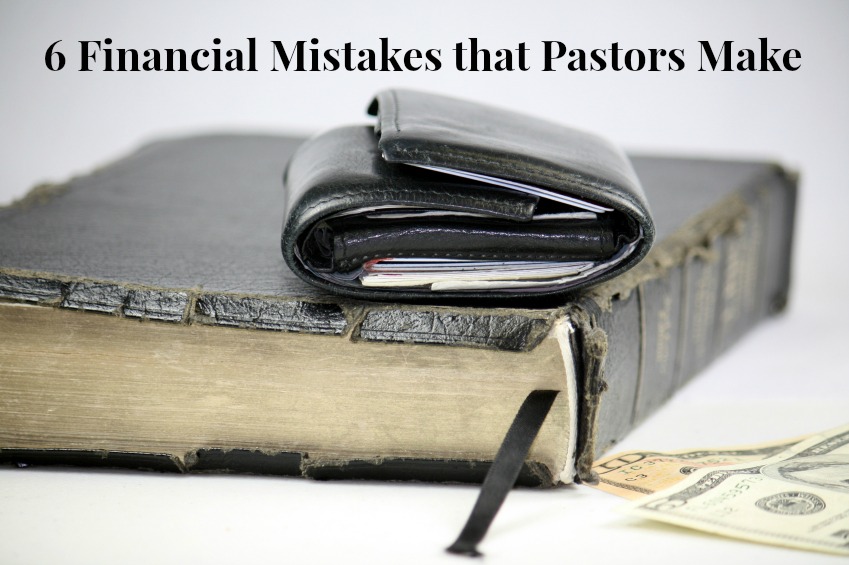Steve is a 60-year-old pastor who can’t even consider retiring from full-time vocational ministry because he has no savings. Even worse, he opted out of Social Security when he started his ministry career 35 years ago. What in the world is he going to do? I’ve coached hundreds of pastors over the past few years, and this is a far too common reality. Pastors are often so busy with vocational ministry that they completely neglect their personal finances. These pastors get into their 50’s and 60’s and start to panic. But there is a better way than hoping you can preach until you die.

Here are six common financial mistakes that pastors make and how you can avoid them:
1. Believing that Money Should be Renounced Rather than Stewarded
There is nothing inherently virtuous about being paid a low salary or living in poverty. There are two common theological errors regarding possessions and faith.
- Poverty Theology considers those who are poor to be more righteous than those who are rich; it honors those who choose to live in poverty as particularly devoted to God.
- Prosperity Theology considers those who are rich to be more righteous than those who are poor; it honors those who are affluent as being rewarded by God because of their faith.
Neither poverty theology nor prosperity theology is biblical.
In the Bible, we see
- Righteous Rich People – Abraham, Isaac, Jacob, Joseph, Job, Joseph of Arimathea, Lydia, and Dorcas.
- Righteous Poor People – Ruth and Naomi, Jesus Christ, the widow who gave her mite, the Macedonian church, and Paul, who often knew want and hunger.
- Unrighteous Rich People – Laban, Esau, Nabal, Haman, the rich young ruler, and Judas Iscariot.
- Unrighteous Poor People – The sluggard and the fool throughout the book of Proverbs.
The Scripture does not teach us to renounce money but to steward it. There is nothing wrong with earning a fair salary as a pastor.
How much should a pastor be paid? Read here for the answer.
2. Not Saving Throughout your Twenties and Thirties
It is sad to see a 60-year old pastor who has given his life to vocational ministry who has almost no retirement savings. These pastors are now frantically trying to save enough to live on after retirement. Perhaps you believe you are never going to retire, but this belief is tested when the church decides it needs a younger pastor, or when you lack the physical health to continue to work full time. Perhaps the best financial decision that I have ever made was to save consistently throughout my twenties. Your twenties and thirties are critical to long-term savings. Save early and as much as possible.
Consider this: If you begin saving for retirement at 25 and put away just $2,000 a year for just 40 years, you’ll have around $560,000, assuming earnings grow at 8 percent annually. But if you wait until you’re 35 to start saving, and put away the same $2,000 a year, you will have saved $245,000 — less than half the money.
Forbes provides this analysis of the value of saving early:
Start saving for retirement at age 15, and you need to save 8% of annual income for life.
Start saving at age 20, and you need to save 11.1% of annual income for life.
At age 25 you need to save 15.4%.
At age 30 you need to save 21.4%.
At age 35 you need to save 30.1%.
At age 40 you need to save 43.2%.
What to do? Aim to save a minimum of 10 percent immediately in your twenties. 15 percent is even better.
3. Failing to Save After Opting out of Social Security
There are varying opinions concerning pastors opting out of social security.
My concern isn’t to speak to whether or not you should opt out but rather to address the failure to save after opting out. Every pastor who has opted out of social security should be saving consistently and aggressively from the moment that he opts out. Far too many pastors have opted out of social security only to live off of this money rather than saving it. Doing so is a recipe for later life disaster. The Clergy Tax Firm I work with tells me that many older pastors come to them crying because they have saved nothing and have no social security. Don’t be that guy! If you have opted out of social security, you should be saving a minimum of 15% of your income immediately.
- Steward money rather than renouncing it
- Save throughout your twenties and thirties
- Save aggressively if you have opted out of social security
Click here to read part 2 of this post: Four More Financial Mistakes Pastors Make

